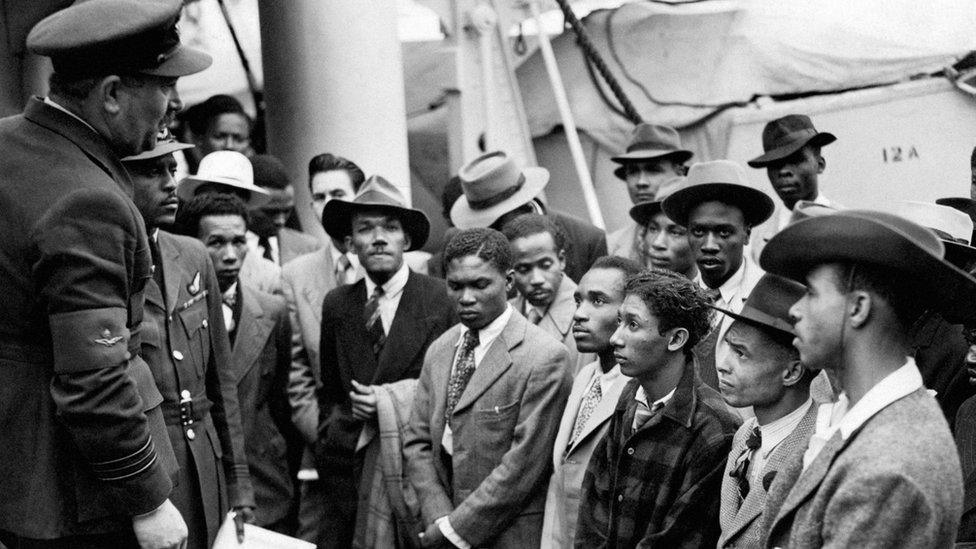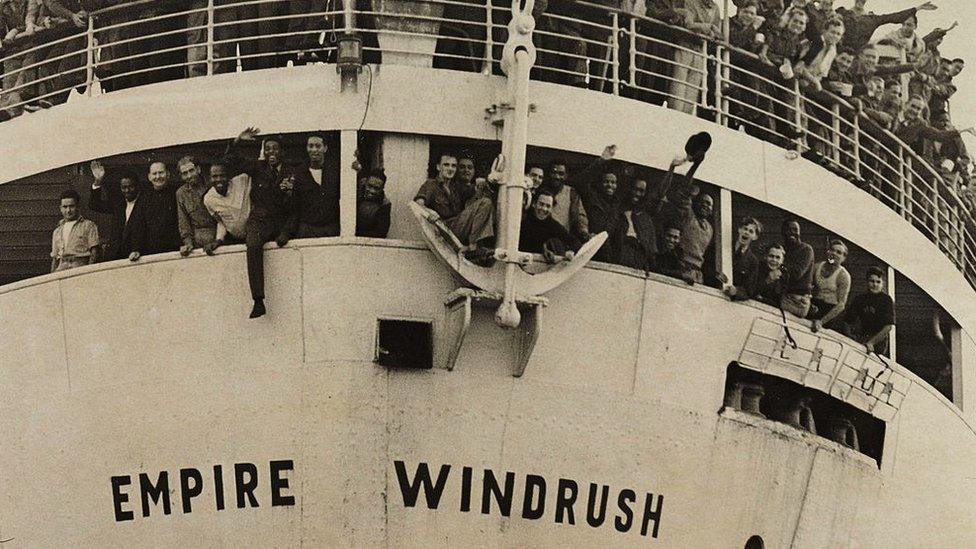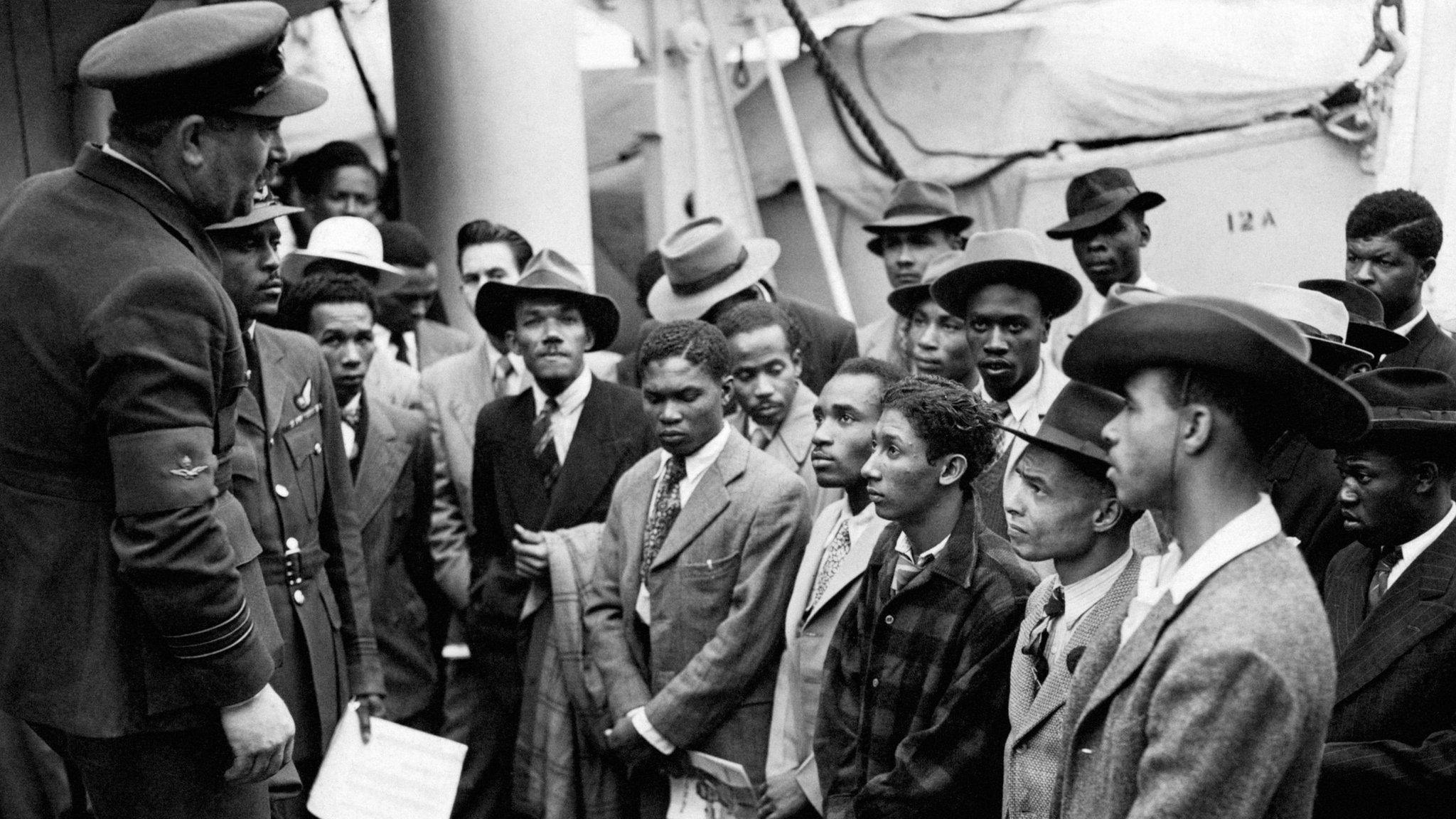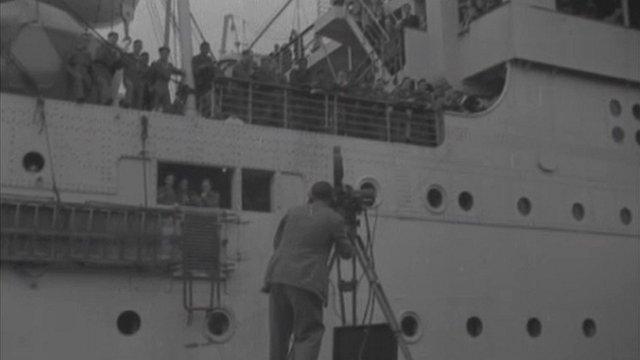Windrush: Charity loses trademark dispute with government
- Published

Jamaican migrants were welcomed by RAF officials as they disembarked the Empire Windrush
A Windrush charity has been ordered to pay £3,800 to the government in costs after losing a trademark dispute.
The Windrush Foundation was seeking to keep six trademarks consisting of variations on the word Windrush.
However, Intellectual Property Office tribunal judge Mark Bryant found in favour of the Department for Levelling Up, Housing and Communities (DLUHC) on most of its oppositions.
Both the foundation and the DLUHC have been approached for comment.
A hearing in September was told the Windrush Foundation already has three trademarks - Windrush Heritage, Windrush Pioneers and Windrush Foundation that are not part of the dispute.
It applied for six further trademarks: Windrush, Windrush Monument, Windrush Memorial, Windrush Day, Windrush70 and Windrush75.
These were all accepted in 2021 and 2022, but the DLUHC later submitted oppositions to these marks under section 3 of the Trade Marks Act 1994.
In its submission, lawyers for the DLUHC accused the charity of applying for the disputed trademarks in "bad faith" and "without an intention to use the marks in respect of the services claimed".
Lawyers for the DLUHC claimed the Windrush Foundation "was fully aware" of government activities related to Windrush, adding the trademarks would "undermine the interests" of the government and other third parties.
They also cited the foundation's opposition, among others, to a Windrush monument erected in Waterloo station, accusing it of applying for the trademarks as part of "pattern of filing intended to disrupt the opponent's ability to refer to the monument and to use Windrush and [associated] terms".
'Windrush revisionists'
During the hearing, Windrush Foundation co-founder and director Arthur Torrington explained the charity "vehemently opposes the opponent's approach to recognising the Windrush Caribbean people" and had made the applications in "an attempt to prevent [the government] spreading what it considered to be the wrong message".
According to the recorded decision on 25 January, external, Mr Torrington said the London-based charity considered the government as being "among 'Windrush revisionists' who are those who would change the original Windrush narrative to that which is more suited to their objectives".
Judge Bryant concluded in the document: "It is clear from the comments of Mr Torrington and the applicant that the primary purpose of filing the contested marks was to prevent the opponent from presenting a version of Windrush heritage that the applicant did not agree with, rather than any genuine intention to trade under the marks."

In 2018 it emerged that the government had not properly recorded the details of people granted permission to stay in the UK, and many were wrongly deported
He continued: "In summary, I find that the filing of these four earlier marks was an act of bad faith and the oppositions succeed, insofar as they rely upon grounds based upon section 3(6) of the Act."
However, Judge Bryant ruled the charity had not acted in bad faith when applying for the trademarks regarding specific services - although he did uphold the government's opposition under section 3(1)(b) of the Act relating to distinctive character.
He explained in the written decision that the word Windrush did not meet the threshold "in respect to any services that promote the interests" of the Windrush passengers or wider Windrush generation.
'Fundamental misunderstanding'
Judge Bryant said the charity's submissions and explanations during the hearing "show a fundamental misunderstanding of trademark law underpinning the applicant's defence", adding that the charity's argument and Mr Torrington's comments "are tacit acknowledgement that the word is nondistinctive (in a trademark sense) because it does not indicate trade origin.
"Rather it is used to identify a historical event, something that anyone should be free to commemorate and in doing so, use the Windrush name."
He awarded the DLUHC "a contribution towards the cost of the five proceedings", totalling £3,800.

Listen to the best of BBC Radio London on Sounds and follow BBC London on Facebook, external, X, external and Instagram, external. Send your story ideas to hello.bbclondon@bbc.co.uk
Related topics
- Published22 January 2024
- Published2 June 2023

- Published26 June 2013
